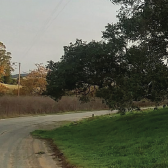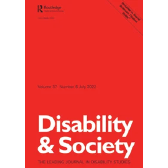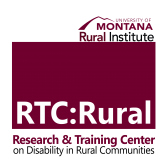|
| |

|
Creating Rural Community Outreach Materials Related to COVID-19 and Disability
Since October 2021, RTC:Rural researchers led by Andrew Myers have been examining vaccine hesitancy and messaging in rural areas through the Rural Disability Hub for Covid-19 Vaccination Outreach. This is one of several regional hubs funded through grants from the Association of University Centers on Disabilities (AUCD) tasked with exploring and improving understanding of vaccination issues affecting people with disabilities.
RTC:Rural researchers have worked with a rural disability stakeholder group to develop a list of recommendations specifically for rural outreach. Researchers packaged this feedback into Practice Guidelines for Creating Rural Community Outreach Materials Related to COVID-19 and Disability. The practice guidelines explain the health challenges of people with disabilities living in rural areas and provide a list of recommendations for rural outreach. The recommendations include guidance and examples related to Messaging, Personal Choice and Control, Universal Public Health Guidance and Practices, and Local Voices and Values.
|
|
|
|
|
|
| |
Participatory Curriculum Development for Health and Independent Living for Disabled People: A Qualitative Study of Participant Experiences
A host of RTC:Rural researchers worked with Center for Independent Living staff members through participatory curriculum development to create and update curriculum for in-person, web-based delivery. Engaging members of the intended audiences in the curriculum development process in this way is a relatively new approach to health promotion. Developing curriculum for and with disabled people had not previously been done, and is shown to be a valuable, worthwhile approach.
Researchers identify and explore three main themes among participants: learning, collaborating, and empowering. Within these themes, researchers and participants alike examine the process and group dynamic of creating the curriculum with as much attention as the end product.
|
|
|
|
|
|
| |
Exploring Metro and Non-metro Difference in Satisfaction with Services and Community Participation among Low-Income Personal Assistance Service Users
RTC:Rural researchers led by Dr. Rayna Sage conducted an exploratory study to consider and contrast metro and non-metro low-income personal assistance service (PAS) users. The research team used self-reported predictors to explore the differences in metro and non-metro PAS consumers, their satisfaction with services, and their satisfaction with community participation.
The most significant findings relate to non-metro users’ challenges in accessing resources and participating in their communities, due to a lack of accessible transportation or a lack of services. This leads researchers to believe that improving accessibility to transportation and services might improve non-metro PAS consumers’ ability to both meet their needs and engage in their communities.
|
|
|
|
|
|
| |

|
Health coaching for people with disabilities: An exploratory mixed-methods study
Can health coaching using a disability-specific curriculum improve health behavior and health-related quality of life for people with disabilities? RTC:Rural researcher Krys Standley pilots a one-on-one health-coaching intervention called Health My Way to examine the effectiveness of health-promotion efforts for people with disabilities. The intervention combined health coaching with two disability-specific curricula, Living Well in the Community and Community Living Skills, to encourage participants to set and support quality-of-life goals and make lifestyle changes in service to those goals.
The results of the pilot study support the effectiveness of health coaching in improving health-promoting behavior among people with disabilities, especially physical activity. Additionally, health coaches were able to generate enthusiasm for goals that are personally meaningful to participants and provide tailored information and social support to establish the coaching relationship and maintain accountability. These themes, which arose in participant interviews, may aid in designing future disability-specific health-coaching curricula.
|
|
|
|
|
|
| |
The Research and Training Center on Disability in Rural Communities (RTC:Rural) conducts research on disability as part of the Rural Institute for Inclusive Communities at the University of Montana.
RTC:Rural is funded by the National Institute on Disability, Independent Living and Rehabilitation Research (NIDILRR) grant number 90RTCP0002 to improve the ability of people with disabilities to engage in rural community living.
|
|
|
|
|
|






